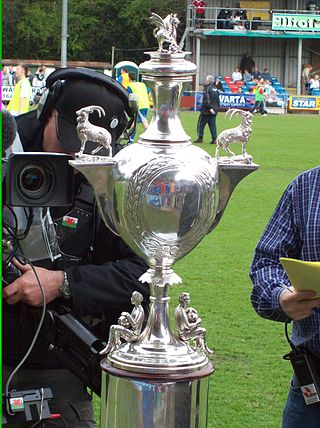Birmingham St. George's F.C. was a football club based in Smethwick, England. The club started as St George's FC in Aston, before moving to the Cape Hill brewery in 1886 under the name Mitchell St George's.

Robert Whittingham was an English footballer who played as an inside-forward for various clubs, mainly prior to the First World War. He played in the Football League for Stoke, Blackpool, Bradford City, and Chelsea. He helped Chelsea to win promotion out of the Second Division in 1911–12. He was the younger brother of fellow footballer Sam Whittingham.

Great Lever Football Club were an English football club founded in 1877, from, Great Lever, near Farnworth in Lancashire, within the town of Bolton, England. The club was briefly one of the best sides in England.
Stafford Road F.C. was an English association football club founded in 1874, which now defunct. The club was connected to the Stafford Road railway works in Wolverhampton, then-Staffordshire.
Alfred Edge was an English footballer. His regular position was as a forward. He played for Stoke, Newton Heath, Northwich Victoria and Ardwick
Victor Horrocks was an English footballer who played football in Staffordshire, most notable with Stoke and Port Vale.

The 1888–89 FAW Welsh Cup was the 12th edition of the annual knockout tournament for competitive football teams in Wales. The competition was won by Bangor.
Lockwood Brothers F.C. was an English association football club based in Sheffield, Yorkshire.
The 2011–12 FA Cup was the 131st season of the world's oldest football knock-out competition, the FA Cup. The closing date for applications was 1 April 2011, and saw 825 clubs apply to enter. On 8 July 2011, the FA announced that 763 clubs had been accepted, which remains, as of 2022-23, the record number of entrants. The final was played on 5 May 2012 at Wembley Stadium. Chelsea won their fourth title in 6 years, and seventh overall, with a 2–1 victory over Liverpool.

The 1883–84 FAW Welsh Cup was the seventh edition of the annual knockout tournament for competitive football teams in Wales.

The 1886–87 FAW Welsh Cup was the tenth edition of the annual knockout tournament for competitive football teams in Wales.
Halliwell F.C. was an English association football club based in Halliwell, in north-west Bolton.
Davenham F.C. was an English association football club, from Davenham, Cheshire.
Darwen Old Wanderers F.C. was an English association football club from the town of Darwen in Lancashire.
Bollington F.C. was an English association football club, from Bollington, near Macclesfield, Cheshire.
Mellors Limited Football Club, also variously given as Mellors' or Mellor's Limited, was an English football club from Nottingham.
East Sheen Football Club was an English football and rugby club from Surrey in England.
Aston Shakespeare Football Club was an English football club from Aston, then in Staffordshire, England.
Hartford St John's Football Club was an English football club from the village of Hartford in Cheshire.

Carnarvon Athletic F.C. was an association football club from Caernarfon in north Wales.



